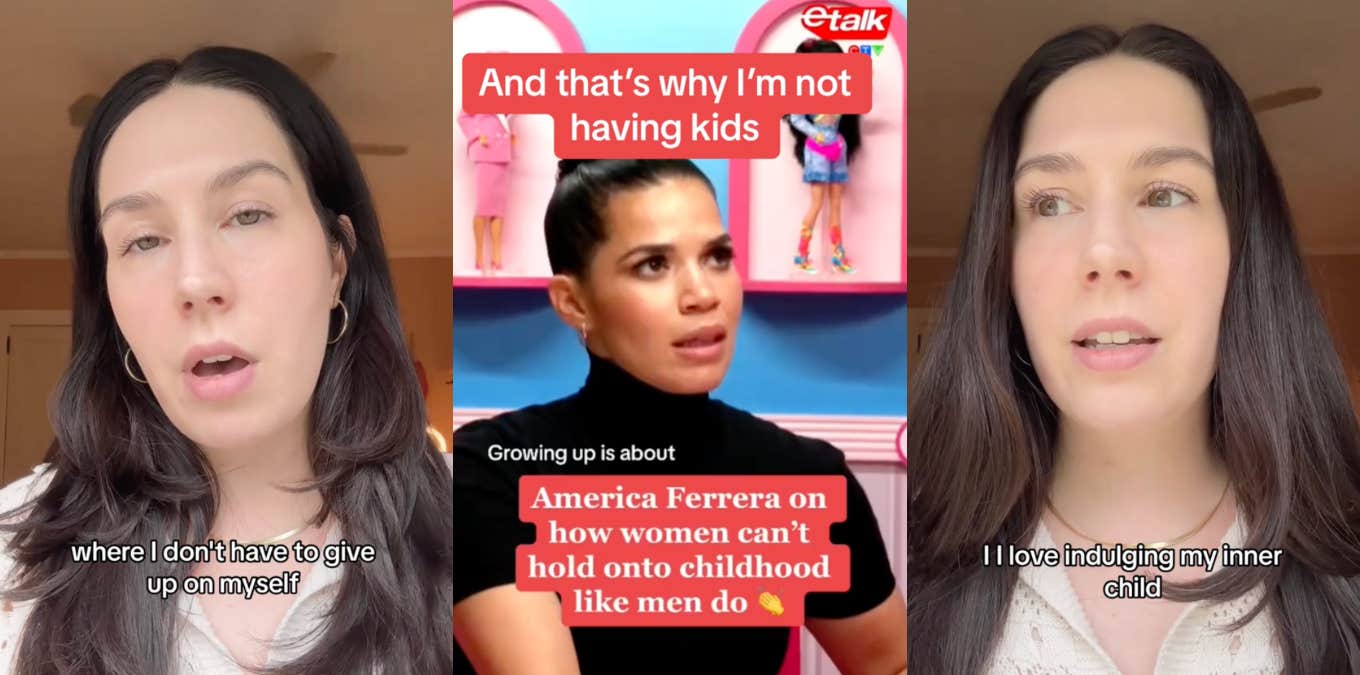Woman Shares How 'Barbie' & America Ferrera's Take On Girlhood & Motherhood Convinced Her She Doesn't Want Kids
Not every woman's journey leads to motherhood, and that's okay.
 @alliehb / @ettalkctv / TikTok
@alliehb / @ettalkctv / TikTok With barely a month since premiering in theaters, Greta Gerwig's 'Barbie' movie has continued to spark conversations surrounding feminity, the patriarchy, and the realities of girlhood and its many phases. However, one woman, Allie, explained in a TikTok video how both the film and comments made by one of the film's lead actresses have forced her to reconsider specific plans she may have had for the future.
She said both the 'Barbie' movie and Ameria Ferrera's comments on motherhood convinced her to remain child-free.
In Allie's video, the 30-something had stitched a clip of an interview America Ferrera, who played Gloria, a mother behind the peculiar instances happening to Margot Robbie's Barbie character, gave with Etalk Canada about her decision to star in the blockbuster film.
Ferrera explained that for women, growing up is about "leaving behind childish things," while men are allowed to still cultivate their inner child and have their mancaves, play video games, and keep all of those "childish" activities.
"That's what really touched me about Gloria as a character. This woman somehow made it to adulthood holding on to the value of play, the value of aspiration, and imagination is in a way counterculture. We can be a lot of things at once. We can be joyful, playful, imaginative, and childlike, and be a grown woman taken seriously," Ferrera said.
For Allie, Ferrera's comments and the way motherhood and girlhood are portrayed in the 'Barbie' movie, convinced her that she doesn't want to give up certain aspects of her life to raise a child. "Women statically do a majority of the child-rearing and work in heteronormative relationships,' she pointed out.
Unfortunately, she's right. According to data acquired by the Pew Research Center, in households where both parents full-time, it's reported that mothers are doing more than fathers when it comes to managing their children's schedules and activities. Some 54% say the mother does more in this area, while 6% say the father does and 39% say parents share this responsibility equally.
"Women do more, and as the 'Barbie' movie says: 'Mothers stand still to watch their daughters go forward,'" Allie remarked.
She explained that she shouldn't have to give up her inner child and certain aspects of girlhood to become a mother.
Allie stressed that she enjoys taking care of her inner child and cultivating certain aspects of her girlhood that would otherwise be erased once she has children.
"If I had kids, all of time my would be spent focusing on their schedules, focusing on their needs, focusing on all the stuff that helps make them successful humans as opposed to myself," she said.
Allie acknowledged that she's incredibly blessed to have been given a mother who took amazing care of her and made her into the woman she is today, but because of all the love and care her mother gave her, it made her realize that she didn't want to be that person. She didn't want to give up all aspects of her life to have a child, no matter how much she looked up to her own mother.
"The 'Barbie' movie really put into perspective just how much women do and take on, and taking this full circle, women do give up childish things earlier because they are expected to take on that mantle," Allie continued.
"I feel extremely blessed to have this lifestyle where I don't have to give up on myself and my inner child on how I always wanted to be when I was a little girl," she concluded.
Women are required to prioritize motherhood above all else, which is an unsustainable belief to put on them.
The way society places expectations on women to prioritize motherhood and caregiving over their own needs and aspirations is both a deeply relatable and important issue that negates how multifaceted women are and that their aspirations are often overlooked for the sake of raising and taking care of a household.
More often than not, we hear of women talking about this immense struggle to figure out their identities after entering motherhood, and how they've lost the sense of the person they were before giving birth. However, I think we forget sometimes that being a mother shouldn't mean having to sacrifice personal growth and self-care.
The 'Barbie' movie, Ferrera's comments, and Allie's interpretation of the two offer a poignant reminder of how societal norms can limit women's choices and dreams.
It's a reflection of how women are often expected to transition into the role of motherhood early and leave behind certain aspects of their own childhood for the sake of pouring all of their love and care into someone else. Except, you can't successfully nurture another soul without healing your own first, and many women often don't get the chance to.
The journey of womanhood should address the freedom to choose — to embrace motherhood if it aligns with one's heart, but also to chase the desires that create satisfaction and fulfillment.
Nia Tipton is a Chicago-based entertainment, news, and lifestyle writer whose work delves into modern-day issues and experiences.

